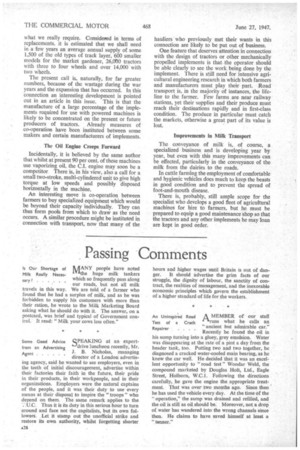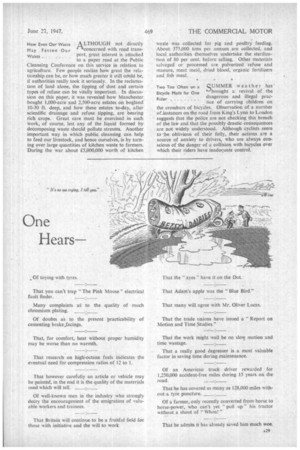Passing Comments
Page 30

Page 31

If you've noticed an error in this article please click here to report it so we can fix it.
hirANy people have noted v Ithe huge milk tankers which so frequently pass along our roads, but not all milk travels in this way. We are told of a farmer who found that he had a surplus of milk, and as he was forbidden to supply his customers with more than their ration, he wrote to the Milk Marketing Board asking what he should do with it. The answer, on a postcard, was brief and typical of Government control. It read: "Milk your cows less often."
is Our Shortage of Milk Really Neces sary
cPEAKING at an export'—'drive luncheon recently, Mr. J. B. Nicholas, managing director of a London advertising agency, said he wanted to see employers, even in the teeth of initial discouragement, advertise within their factories their faith in the future, their pride in their products, in their workpeople, and in their organizations. Employers were the natural captains of the people, and it was their duty to use every means at their disposal to inspire the " troops " who depend on them. The same remark applies to the Thus it is its duty in this serious hour to turn around and face not the capitalists, but its own followers. Let it stamp out the unofficial strike and restore its own authority, whilst forgetting shorter
Some Good Advice from an Advertising Agent
hours and higher wages until Britain is out of dan ger. It should advertise the grim facts of our struggle, the dignity of labour, the sanctity of contract, the realities of management, and the inexorable economic principles which govern the establishment of a higher standard of life for the workers.
An Uninspired Road A MEMBER of our staff Test of a Crack r-kruns what he calls an Repairer . . . " ancient but admirable car." . Recently he found the oil in his sump turning into a gluey, grey emulsion. Water was disappearing at the rate of a pint a day from the header tank, too. Putting two and two together, he diagnosed a cracked water-cooled main bearing, as he knew the car well. He decided that it was an excellent opportunity to "road test" Wondar Weld, the compound marketed by Douglas Holt, Ltd., Eagle Street, Holborn, W.C.1. Following the directions carefully, he gave the engine the appropriate treatment. That was over two months ago. Since then he has used the vehicle every day. At the time of the " operation," the sump was drained and refilled, and the oil is still as oil should be. Moreover, not a drop of. water has wandered into the wrong channels since then. He claims to have saved himself at least a " twiner." How Even Our Waste ALTHOUGH not directly May Patten Our "concerned with road trans
Waists. . . . port, great interest is attached to a paper read at the Public Cleansing Conference on this service in relation to agriculture. Few people realize how great the relationship can be, or how much greater it still could be, if authorities really took it seriously. In the reclamation of land alone, the tipping of dust and certain types of refuse can be vitally important. In discussion on this paper, it was revealed how Manchester bought 1,000-acre and 2,500-acre estates on bogland 10-30 ft. deep, and how these estates to-day, after scientific drainage and refuse tipping, are bearing rich crops. Great care must be exercised in such Work, of course, lest any of the liquid formed by decomposing waste should pollute streams. Another important way in• which public cleansing can help to feed our livestock, and hence ourselves, is by turning over large quantities of kitchen waste to farmers. During the war about £5,000,000 worth of kitchen waste was collected for pig and poultry feeding. About 375,000 tons per annum are collected, and local authorities themselves undertake the sterilization of 80 per cent. before selling. Other materials salvaged or processed are pulverized refuse and manure, meat meal, dried blood, organic fertilizers and fish meal.
Two Too Often on a Q,UMMER weather has Bicycle Made for One `--'brought a revival of the tice of carrying children on the crossbars of bicycles. Observation of a number of_instances on the road from King's Lynn to 'London suggests that the police are not checking this breach of the law and that the possibly drastic consequences • are not widely understood. Although cyclists seem to be oblivious of their folly, their actions are a source of anxiety to drivers, who are always conscious of the danger of a collision with bicycles over which their riders have inader:uate control.




































































































